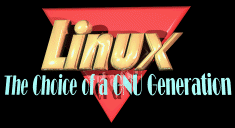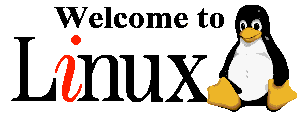LINUX - The best OS around
If you are not familiar with Linux
Linux is a freely-distributable, independent UNIX-like
operating system for Intel x86, Motorola 68k, Digital Alpha, Sparc, Mips,
and PowerPC machines.
Linux was originally created by Linus Torvalds at the University of Helsinki in Finland. It has been developed with the help of many programmers across the Internet.
 Linus originally started hacking the kernel as a pet project, inspired by his
interest in Minix, a small UNIX system developed by Andrew Tannenbaum.
He set out to create, in his own words, "a better Minix than Minix". And
after some time of working on this project by himself, he made this posting
to comp.os.minix:
Linus originally started hacking the kernel as a pet project, inspired by his
interest in Minix, a small UNIX system developed by Andrew Tannenbaum.
He set out to create, in his own words, "a better Minix than Minix". And
after some time of working on this project by himself, he made this posting
to comp.os.minix:
``Do you pine for the nice days of Minix-1.1, when men were men and wrote their own device drivers? Are you without a nice project and just dying to cut your teeth on a OS you can try to modify for your needs? Are you finding it frustrating when everything works on Minix? No more all-nighters to get a nifty program working? Then this post might be just for you.
As I mentioned a month ago, I'm working on a free version of a Minix-lookalike for AT-386 computers. It has finally reached the stage where it's even usable (though may not be depending on what you want), and I am willing to put out the sources for wider distribution. It is just version 0.02...but I've successfully run bash, gcc, gnu-make, gnu-sed, compress, etc. under it.''
On October 5th, 1991, Linus announced the first ``official'' version of Linux, version 0.02. Since then, many programmers have
responded to his call, and have helped to make Linux the fully-featured operating system it is today.
I started out with the SLS distribution, which doesn't exist anymore, and later (from around version 0.96) switched to the Slackware distribution. I went through several kernel versions, and right now, I am running the Slackware distribution (currently Slackware 10.1) on a Intel Celeron 2.5GHz with 1GB RAM. I am using a 2.6 kernel, downloaded from kernel.org, since Slackware 10 doesn't use the 2.6 kernels yet by default.
I am running X-Windows with KDE. When I have some spare time (probably not going to happen anytime soon ;-) I am going to play with Gnome and Enlightenment.
This site is now running on a small network consisting of the aforementioned PC with Linux and Apache configured as a firewall and a Sony laptop dual-booting Windows XP and Slackware 10 behind the firewall. I also have an old Compaq ProSignia PC, which I use to experiment with Solaris and the BSD variants. My site is connected via Ethernet to the UCI network, which in turn has a T3 to the world. I think the speed is good enough for the time being ;-)
The Sony Vaio Z505LS laptop originally came with Windows ME. Of course I had to install Linux on it. I have put up a page describing my experiences.
I recently got my ancient framegrabber card working with the 2.6 kernel. The patch can be downloaded from here.
The Unix User Association of Southern California (UUASC).
Linux was originally created by Linus Torvalds at the University of Helsinki in Finland. It has been developed with the help of many programmers across the Internet.

``Do you pine for the nice days of Minix-1.1, when men were men and wrote their own device drivers? Are you without a nice project and just dying to cut your teeth on a OS you can try to modify for your needs? Are you finding it frustrating when everything works on Minix? No more all-nighters to get a nifty program working? Then this post might be just for you.
As I mentioned a month ago, I'm working on a free version of a Minix-lookalike for AT-386 computers. It has finally reached the stage where it's even usable (though may not be depending on what you want), and I am willing to put out the sources for wider distribution. It is just version 0.02...but I've successfully run bash, gcc, gnu-make, gnu-sed, compress, etc. under it.''
On October 5th, 1991, Linus announced the first ``official'' version of Linux, version 0.02. Since then, many programmers have
responded to his call, and have helped to make Linux the fully-featured operating system it is today.
My Linux experience
I first heard about Linux through an article in the German computer magazine c't, I think sometime in 1992. The first version I downloaded and installed was 0.12. Although it was far from perfect, all the GNU tools were working on it. Before switching to Linux, I had unsuccessfully tried to get the GNU C/C++ compiler running on SCO Unix on my 386 box. I never touched SCO Unix since...I started out with the SLS distribution, which doesn't exist anymore, and later (from around version 0.96) switched to the Slackware distribution. I went through several kernel versions, and right now, I am running the Slackware distribution (currently Slackware 10.1) on a Intel Celeron 2.5GHz with 1GB RAM. I am using a 2.6 kernel, downloaded from kernel.org, since Slackware 10 doesn't use the 2.6 kernels yet by default.
I am running X-Windows with KDE. When I have some spare time (probably not going to happen anytime soon ;-) I am going to play with Gnome and Enlightenment.
This site is now running on a small network consisting of the aforementioned PC with Linux and Apache configured as a firewall and a Sony laptop dual-booting Windows XP and Slackware 10 behind the firewall. I also have an old Compaq ProSignia PC, which I use to experiment with Solaris and the BSD variants. My site is connected via Ethernet to the UCI network, which in turn has a T3 to the world. I think the speed is good enough for the time being ;-)
The Sony Vaio Z505LS laptop originally came with Windows ME. Of course I had to install Linux on it. I have put up a page describing my experiences.
I recently got my ancient framegrabber card working with the 2.6 kernel. The patch can be downloaded from here.
Moonclock for Linux
Way back in the early nineties, Gunter Sprenger, a friend of mine, added a moon phase feature to the well-known oclock program, modeled after his wristwatch. I have it in daily view on my X desktop. It is available at ftp://ftp.x.org. Or you can download the Linux binaries in ELF file format here.Local User Groups
The Orange County Linux User Group (OCLUG).The Unix User Association of Southern California (UUASC).




